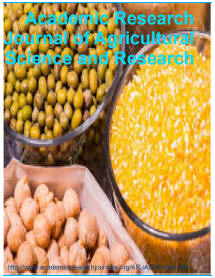| ARJASR |
Academic Research Journal of
Agricultural Science and Research |
||||||||||||||||||||||
|
Academic Research Journal of Agricultural Science and Research Vol. 4(6), pp. 297-320. November, 2016. ISSN: 2360-7874 DOI: 10.14662/ARJASR2016.037 Full Length Research Determinations of Haricot Bean (Phaseolus vulgaris L.) Planting Density and Spatial Arrangement for Staggered Intercropping with Maize (Zea mays L.) at Wondo Genet, Southern Ethiopia
Belstie Lulie1*, Walelign Worku2 and Sheleme Beyene3
1Ethiopian Institute of Agricultural Research, Wondo Genet Agricultural Research Center, P.o.box, 198, Shashemene, Ethiopia 2, 3 Hawassa University College of Agriculture, P.o.box, 05, Hawassa, Ethiopia *Corresponding author’s email: kbelstie@yahoo.com Accepted 5 November 2016
Wondo Genet
area, which is located in Sidama zone of south Ethiopia, is
characterized by rapidly increasing human population and scarcity of
arable land per household. There is a need for developing an efficient
cropping system in order to use the limited land efficiently and to
enhance food security. An experiment was, therefore, conducted at Wondo
Genet agricultural research center experimental farm to determine the
optimum proportion and spatial arrangement of haricot bean under
staggered intercropping with maize and assess the biological efficiency
and economic return. The trial was a 2 x 4 factorial arrangement in RCBD
design consisting of ten treatments: two haricot bean spatial
arrangements (single and double row) and four haricot bean densities
(250000, 187500, 125000 & 62500 plants ha -1). The analysis of variance
indicated that cropping system revealed significant effect on yield and
yield components of maize where significant reduction was found under
intercropped plots. Sole cropped maize had highest yield (7.87 ton ha-1)
and intercropping with bean reduced its yield by 10 %. On the other
hand, the spatial arrangement by planting density interaction
significantly affected grain yield of haricot bean where the maximum
(2.24 ton ha-1) and minimum (0.95 ton ha-1) yields were recorded at 100%
haricot bean population density with a double row arrangement and 25%
density with single row arrangement, respectively. The cropping system,
on the other hand, significantly influenced all yield and yield
components of haricot bean except seed number per pod. The highest grain
yield (2.62 ton ha-1) of haricot bean was obtained at sole planting
compared to that of intercropping (1.58 ton ha-1) with maize showing 40%
loss. In general, relative yields of component crops were reduced in
mixture and haricot bean showed greater degree of yield reduction than
its respective maize counterpart. Additionally, intercropping of maize
with haricot bean had total LER value greater than 1 which showed the
advantage of intercropping over sole cropping of each crop.
Intercropping of the two component crops at 100 and 75% population
density (statistically at par) achieved total LER values of 1.69 and
1.61 and MAI values of 21445 and 19817 ETBha-1 respectively. Therefore,
haricot bean with a density of 187500 plants ha-1 and at a spacing of
either 80 *7cm (1:1) or 40 * 14cm (1:2) could be recommended for
intercropping with maize 30 days after maize planting in the target
area, based on its better compatibility, productivity and economic
benefit. How to cite this article: Lulie B, Worku W, Beyene S (2016). Determinations of Haricot Bean (Phaseolus vulgaris L.) Planting Density and Spatial Arrangement for Staggered Intercropping with Maize (Zea mays L.) at Wondo Genet, Southern Ethiopia. Acad. Res. J. Agri. Sci. Res. 4(6): 297-320
|
|
|||||||||||||||||||||
